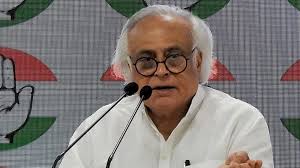
Congress alleges government plans special Parliament session to mark 50 years of Emergency

 :
| Updated On: 29-May-2025 @ 1:34 pm
:
| Updated On: 29-May-2025 @ 1:34 pmSHARE
The Congress party on Thursday accused the Narendra Modi-led government of planning a special session of Parliament on June 25–26 to commemorate the 50th anniversary of the Emergency imposed in 1975. According to Congress, this move is a deliberate attempt to distract public attention from more pressing national issues. Congress general secretary in-charge of communications, Jairam Ramesh, called it "yet another classic exercise in distraction" by Prime Minister Modi.
Ramesh highlighted that since April 22, the Congress party has been consistently demanding an all-party meeting to address the recent terror attack in Pahalgam and its consequences. The party proposed that the meeting be chaired by the Prime Minister himself. However, no such meeting has taken place. Furthermore, on May 10, both the Leaders of the Opposition in the Lok Sabha (Rahul Gandhi) and Rajya Sabha (Mallikarjun Kharge) wrote to the Prime Minister requesting a special session of Parliament to address the terror attack and pass a resolution that would reflect national unity and resolve. Ramesh expressed disappointment that the Prime Minister did not respond to this appeal either.
Instead, Ramesh noted that the government appears to be planning a special parliamentary session around June 25–26, coinciding with the Emergency's 50th anniversary. He linked this with the recent announcement by the government declaring June 25 as "Samvidhaan Hatya Diwas" (Constitution Killing Day), further suggesting a political agenda behind the decision. The Congress leader interpreted the move as a political maneuver aimed at drawing focus away from current challenges such as national security and governance.
In a pointed critique, Ramesh accused Prime Minister Modi of effectively placing India under an "undeclared Emergency" for the past 11 years. He alleged that the Prime Minister has consistently avoided answering tough questions, such as why the perpetrators of the Pahalgam terror attack remain untraced, why he allowed then-US President Donald Trump to play the role of a mediator in Indo-Pakistani affairs, and why he gave what appeared to be a clean chit to China during the 2020 border standoff.
Congress also raised questions about the government's silence on President Trump's repeated claims that he helped broker peace between India and Pakistan during heightened military tensions. The Indian government, however, officially dismissed these claims, stating that any ceasefire agreement or negotiation is strictly a bilateral matter between India and Pakistan, and that Islamabad had reached out to New Delhi requesting a cessation of hostilities.
The Congress's statement reflects broader concerns within the opposition that the Modi government is not prioritizing serious national issues and is instead focusing on symbolic or politically convenient narratives. The party reiterated that the government should instead concentrate on addressing national security challenges, restoring political accountability, and ensuring a united front in times of crisis.
Contact Us
House. No. : 163, Second Floor Haridev Rd, near Puberun Path, Hatigaon,Guwahati, Assam 781038.
E-mail : assaminkcontact@gmail.com
Contact : +91 8811887662
Enquiry
×
Reporter Login
×